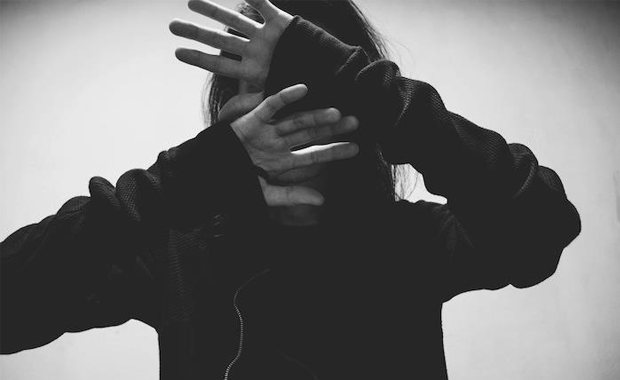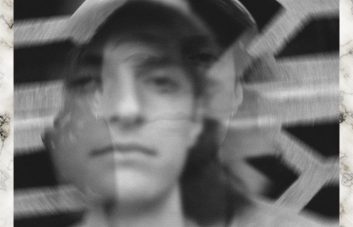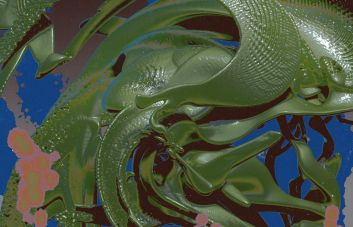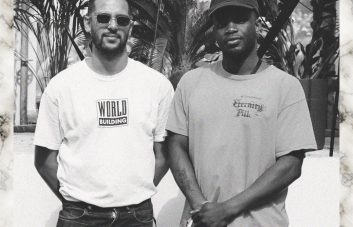It is not often that the relationship between an artist and its label feels quite as organic as Stroboscopic Artefacts and its Singaporean delegate Xhin have established for themselves. The Berlin-based label, led by its founder Lucy, have continuously exhibited sounds that are motivated by a self-proclaimed curiosity of a scientist and manage to challenge accustomed dancefloor music in a manner most inviting. Xhin’s output and the effect it has on its listeners are no different. His third album and first full-length installment to appear on Stroboscopic Artefacts entitled “Sword“ was released last year, and it displayed exactly those qualities immaculately that draw us towards his sounds. Throughout his work, Xhin possesses an unprecedented expertise in crafting sounds that constantly surprise us and push us towards our boundaries, while simultaneously feeling oddly comfortable all the same. We had the opportunity to speak to Xhin a few weeks back in December in Singapore, covering topics such as his creative process, his narrative perspective in music and what we can expect to emerge from his talent in time to come.
Stream: Lucy & Xhin – LX4 (CLR)
Hi Xhin! What have you been keeping yourself busy with lately? “I’ve mostly been touring, I just came back for Christmas. I’ll be a having a small gig over here in Singapore, which is quite rare. Unfortunately, the general support here is not good enough – not from the people themselves, but from the big boys behind events, which is why I don’t play here very often. After that I’ll be heading over to Europe to tour again in January and February. I currently also need to work on some releases and remixes that need to be done within this year.”
What can you tell us about your creative process? What does it look like, do you follow the same type of pattern each time or does it differ each time? “I would say eighty percent of my creative process depends on my mood. I like to work with things that occur in my everyday lifestyle, so if I’m happy today I’ll probably work on some stuff that’s quite energetic or if I’m very emotional I’ll probably do something along those lines. There is a certain pattern that recurs of course, but parts of it are also very random. I try to keep the same sort of progression throughout my work, not necessarily the same style. I think it’s good for an artist to be like that, not to change things too often. I think as an artist I’m quite stubborn, I like to create things that I can call my own and that I am proud of.”
You’ve mentioned before that you usually embark on creating a body of work with a certain idea behind it beforehand. What type of ideas would you identify with respects to one EP or album? “For each release I try to create some sort of a story, so that people can relate to something in it. They don’t have to relate to what I was thinking exactly throughout creating the whole thing, I think the point is to let people decide. I try to infuse whatever emotions I want to convey by means of things like a title, certain sounds or frequencies. I like the darker side of fairy tales. I like everything that falls within a dark atmosphere actually; forests, trees, elements that are very organic. I like to create music that relate to those kinds of atmospheres. That is for now at least, maybe in the future things will change.” I think many would agree that your music sound very organic. Does nature play an important role as a creative inspiration? “Yeah, pretty much. For example, last year I went for a gig in a city in Germany and I visited a dark forest that surrounded it, I loved being there. There were times that I almost felt like there was something out there chasing me. I think in that respect I’m a very dark person and draw inspiration from that.”
I understand you’re interested in watching films and documentaries on historical people and war. What is it about these that you find fascinating? “I find that hard to explain. I suppose it’s just life and death. Nostalgia of people, the way they live, the way that we use things.” Do you think that there is a link between the creativity behind both film and music, is the storytelling element you describe in your music something similar to that of films and documentaries? “No, I wouldn’t say so. I just get some ideas and inspirations from films and documentaries, but in the end I just describe myself in the story of my music. You could say that I am the lead character. So maybe it’s about friendships, family, relationships within my life and I try to bring that back in my production. I want my audience to know that electronic music has soul. It’s not just about music for the dancefloor, you can listen to it at home and reflect on things from your past or your own emotions.”
What would you describe as the most important influence on your creative process aside from your own mood? “My friends. Within the conversations that I have with them, within the situations that I share with them, I am inspired by that a lot. It’s very hard to describe but I think when I’m inspired by that, the music and frequencies that I create reflect on what I’ve shared with them.”
Do you ever worry about the intentions behind your music being lost in translation to the listeners, or possible misinterpretations? “No, I don’t really care about that. It’s up to them whether they want to enter my world or not. Maybe some people can actually describe you through your songs, but some people don’t have that capacity and that’s okay too. As long as I have songs to deliver that can trigger people to think about the music and form their own interpretations.”
Stream: Xhin – Elliptic (Token Records)
What about when you work on a remix for someone else, is the process similar? Do you identify an idea to incorporate into the piece beforehand or do you work with elements from the original to take you to an idea? “Oh yeah, I definitely work with whatever elements I already have when it comes to a remix. But it also depends on the original piece of music, and what that sounds like. If I don’t really like the original I won’t do it to begin with. I would say that I try to rework the original and try to have a balance that fifty percent still keeps close to elements from the original, and the other half I try to sound like myself.”
You’ve had a number of reworks of your own work done by other artists, for example as we could prominently see on the Cutlass EP. What has been your favourite reinterpretation of your own work done by another artist to date and could you tell us why? “For now it’s the Surgeon remix of my track “Teeth”. That has to be a remix coming from an artist that I really admire and that I love what he’s doing, what he has done in the past and how it inspired me. It was an honour for him to remix one of my tracks and he did a really great job.”
Up until now you haven’t collaborated with many other artists in creating releases. Can you tell us a little bit about your collaborations with artists and what you find important when collaborating with other musicians? “It’s important for us both to have the same habits in creating music. I’ve had fun working with Lucy, maybe that was because we were already friends for many years prior to our collaboration. But for myself in general, I don’t really enjoy collaborating with someone else. I like to work with myself more than anybody so that I can have more freedom and I don’t have to compromise so much, or agree or disagree with another person. I guess I’m just happy working alone.”
You say that for now you’re happy working alone, but is there still a collaboration you hope to see happen in the future? “Maybe a collaboration outside of club music. I wanted to do something different a long time ago, I just didn’t find the right people to do it with. I’d like to do something else outside of club music.” Do you ever feel confined by the sounds that are attached to your name by what you’ve already released thus far? Do you take your previous work as a starting point when creating new music? “No, actually I don’t worry about that. No matter what kind of stuff I put out, it’s always going to have my own sound to it. I guess it’s just a habit of how I do things. It’s like getting up, going to eat and sleep, you have to do it. Whenever I go to the studio, I have to do it my distinctive way as well. It’s always going to sound like me.”
Stream: Function & Jerome Sydenham – Drift (Xhin Remix) (Ibadan)
In a past interview Lucy stated “that the more I get close to my artists and give them the respect they deserve, the more and more they act in the same way with me and with the platform.” How has your relationship grown with him and Stroboscopic Artifacts? “Both me and Lucy were very unknown in the past and we were both signed to this German label and we became colleagues. Because of that, we started talking a lot through Skype as we liked each other’s output. At some point, the label we were signed on wasn’t doing very well so he decided to create his own label. One day, in the morning when I was in Singapore, he told me that he was going to start a label and asked me whether I’d be keen on that. I was, and I sent some tracks over to him and he liked it, and from there it grew into Stroboscopic Artefacts.” What values do you and Stroboscopic Artefacts share to make your collaboration such a successful one? “With Stroboscopic Artefacts, it’s not about business. It’s more about friendship. We’re very close and we all respect one another and there is a lot of mutual trust, it’s just very instinctive.”
What is the most important thing that you have learned during the process of recording and releasing your “Sword” album last year? “That album is actually very important to me, because I put a lot of emotion into it. The whole album reflects my mind and everything that I’ve been through. It’s kind of boring to tell people straight up what happened, but I don’t have to. Electronic music has no words but the best way for people to understand is through the music itself, perhaps its song title as well. I’m actually quite proud of making “Sword”, it took me a year, it’s very emotional and I’m just really happy with what I’ve done.”
You’ve mentioned before that you like flirting with genres during your set and not playing strictly what people might expect from you. How do you usually go about this genre flirting, do you consciously try to make an effort to play various genres each night or is it just a matter of what’s currently on your radar? “I like to play whatever tracks I really like and listen to every day. I think it’s more fun to work that way in a club. Because I’m a DJ, but of course I’m a club-goer as well. I go to every club and at each club there’s people playing the same kind of songs and I get bored and only end up dancing for like five to ten minutes and stay bored the rest of the night. So the question is what can we do to make the clubbers themselves enjoy and be the centre of the night? Maybe not all clubbers know who the DJ is, or even buy music or take it as seriously as others might. Some people might hate the track that you play, but what can you do? You can’t please every listener. I always try to look at the reaction of the audience nonetheless, whether they’re still dancing or have stopped dancing and what the reason it for it. It’s just like listening to music on your iPhone, I listen to different kinds of music every day.” Do you ever feel like you need to draw a line between what’s acceptable on the dancefloor, do you think that there’s a border between those two fields? “There’s definitely a risk to be taken. I just take the risk to do it. If you do not take the risk, you will never know what might happen if you do. And I feel that not many artists take risks. But I don’t believe that there is such a category as “music that is acceptable for the dancefloor”, it really depends on the people that are present and the risks you are willing to take.”
When we think about categories of music, especially when it comes to dance music, we’re lead to consider the function of music – how much does the intentionality of audience or the functionality of music for DJs play a role in your work? “There will always be this kind of idea of “dance music”, and it has to be able to make people dance. But in my theory, I don’t draw those lines and I don’t do that. I want to try to make people dance through “non-dance” music.” Do you consider what you make as “dance music”? “Yeah, I mean it depends on you. Some people like to dance to a 4×4 beat, but some people like to dance to broken beat, to breakbeat or drum & bass, while others could never dance to drum & bass. You can’t really argue about what dance music really is.”
How would you define a good DJ set when seeing others play? “I like DJs that give you a feeling of not really knowing what to expect. You might not know what tracks he plays each evening, and he just surprises you each time. I like DJs like that, there aren’t many of them out there. When I see DJs like that perform, I begin to love clubbing again.”
Your location in Singapore has been often discussed and you’ve previously stated that you see it as irrelevant with respects to your own production process. I did, however, want to ask whether you see any advantages you gain in being located in a growing music scene as opposed to for example your peers in much more settled musical environments such as Berlin? “I don’t know about other people, but when I speak for myself I can say that I like being here because it’s a way for me to get back to reality. I travel, I play in other cities, but I don’t want to be in a city that involves so much music, I’d get sick of it. I like to be here and to be able to feel “normal” again. To have my coffee and breakfast in the morning, literally in the morning, not in the afternoon. For me it’s just to get off the working line into reality again and just be a commoner, going clubbing, just be with my close friends etcetera.” So would you say that you like to keep your professional and personal lives separate? “Yes, certainly.”
Where do you primarily look for other sources of inspiration outside of Singapore? “I travel a lot, most of my gigs are in Europe so I am there often. I guess I get it from different cities across Europe. Germany is quite inspirational to me, and it’s not just Berlin. For me a place becomes inspirational due to the people within the location and the dynamics of how those people work.” Is there some place that you would like to visit still where you haven’t been yet? “I’d like to go to different cities in Italy. I’ve played Venice, and every time I play cities like that I don’t really get to visit the city itself due to having to leave the immediate morning after playing. I absolutely enjoy sightseeing as a part of my travels as a DJ, but unfortunately there’s often not much time to do it. I’d love to stay at places for two or three days, but sometimes time does not allow me to do that.”
Yeah, it unfortunately doesn’t seem like DJ schedules allow for a lot of free time in distant places. Moving on, what projects can we expect from you in the near future? “There will be two EPs early next year, maybe more later. There will be a remix for Oscar Mulero coming out next year as well. Hopefully I’ll see myself touring the States and Australia again.” What things are you looking forward to in the new year, music wise? “Like I said, I’d like to do something outside of club music. Perhaps next year you will see me do something like that.”
Finally, when was the last time you danced and why? “The last time I danced was in Berghain! I guess the DJ played my favourite sound, I can’t remember what that was at the time. I do dance though, I mean I know that some DJs claim that they don’t dance, but I’m not like that. I don’t care whether it’s techno, house, disco or eighties seventies or sixties music, as long as it’s good music and good vibes among friends, why not? You are human after all.”





Really enjoyed this article about one of our favorite techno artists. Xhin’s music inspires us!
All the best,
[o]